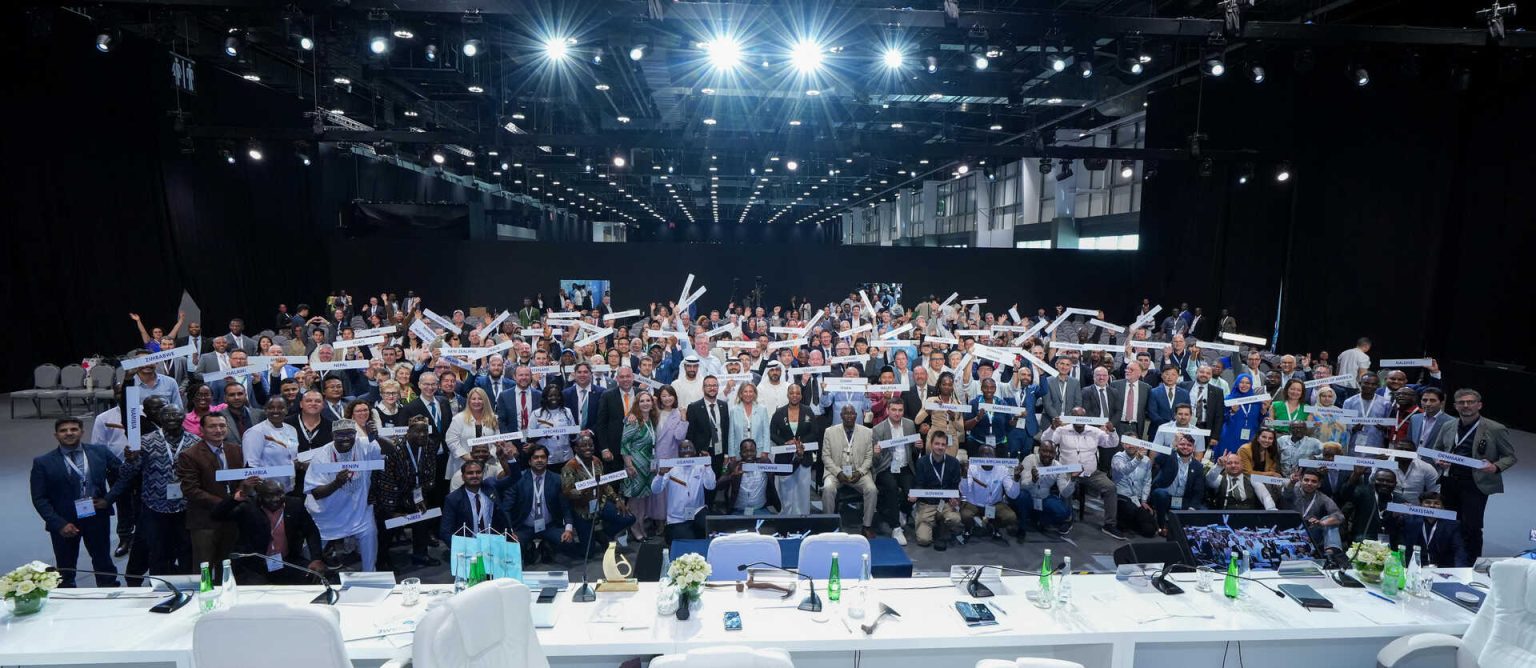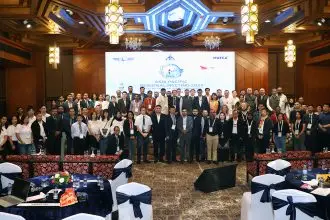Abu Dhabi, United Arab Emirates – 28 APRIL – 02 MAY 2025


by Nicola NìRìada
IFATCA Communications CoordinatorThe 64th IFATCA Annual Conference was held in Abu Dhabi, United Arab Emirates, from 28 April to 2 May 2025. Hosts for the event were our colleagues from the Emirates Aviation Association (EAA).
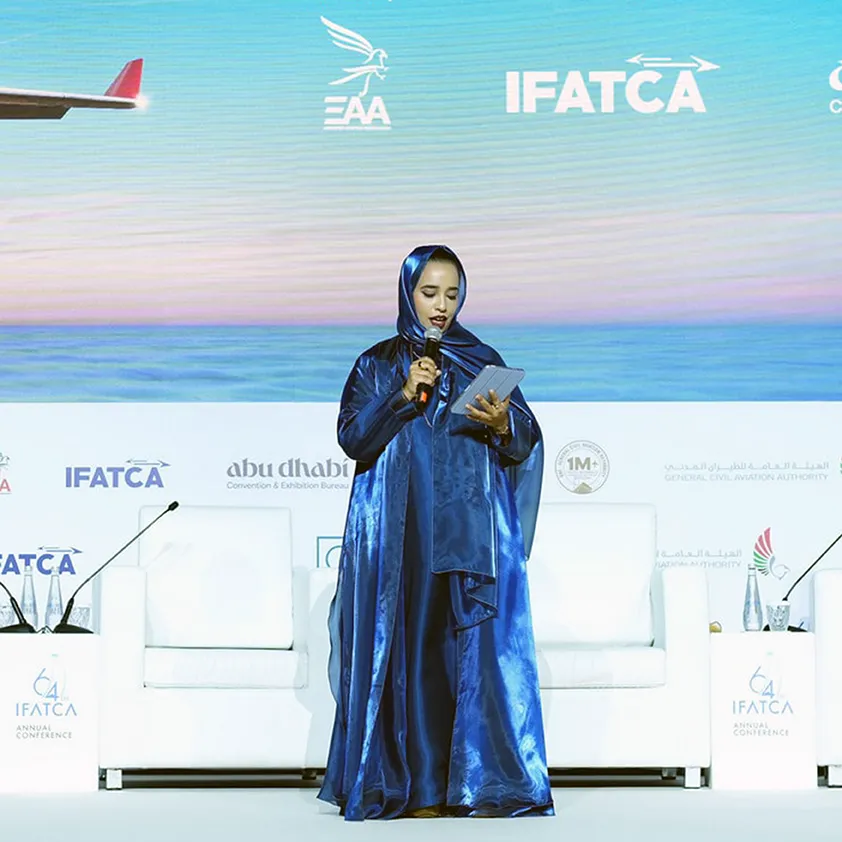
Opening Ceremony
The Master of Ceremonies for the opening event was Emirati Air Traffic Controller Jouhayna Almheiri. Numerous local dignitaries attended the event, which featured a beautiful cultural piece. One of the highlights was the signing of a Declaration of Cooperation between IFATCA and CANSO, recognising the critical role of air traffic controllers, the urgent issues of global staffing shortages, and the need for multifaceted and collaborative solutions in recruitment, training and retention.
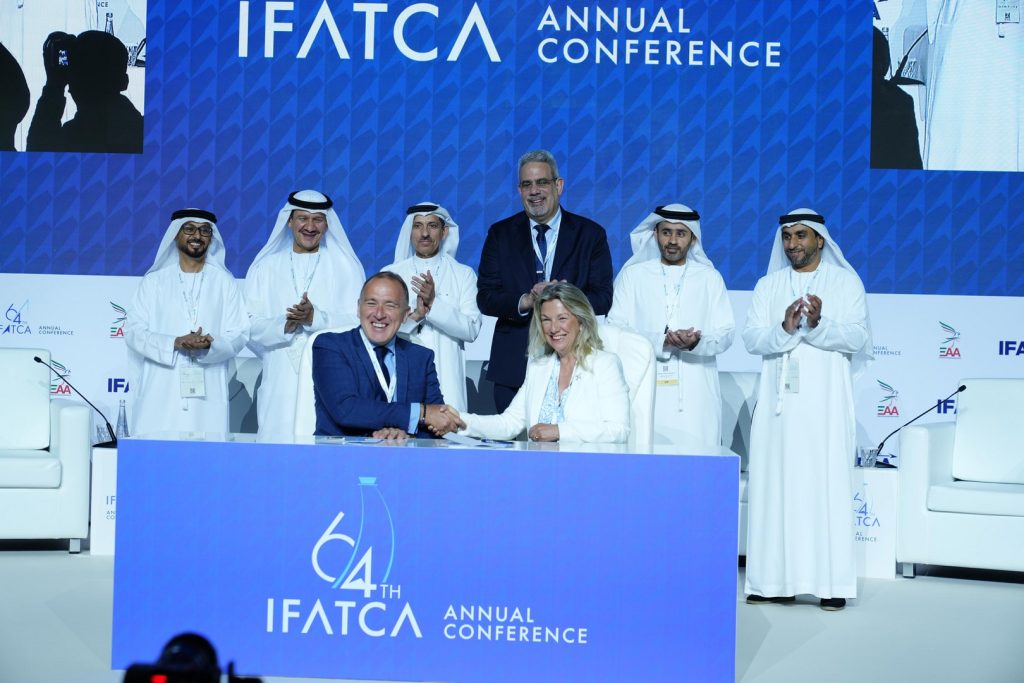
Key Panels
Two panel discussions generated interesting and lively debates thanks to the knowledge and engagement of the panel members. A first panel, titled Transforming Airspace for Sustainable Aviation, was moderated by IFATCA’s Executive Vice President Asia/Pacific, Cheryl Chen; and our ICAO ANC Representative, David Perks. Read more about the panel via this link: IFATCA General Assembly Panel 1 – Transforming Airspace for Sustainable Aviation | Global Airspace Radar
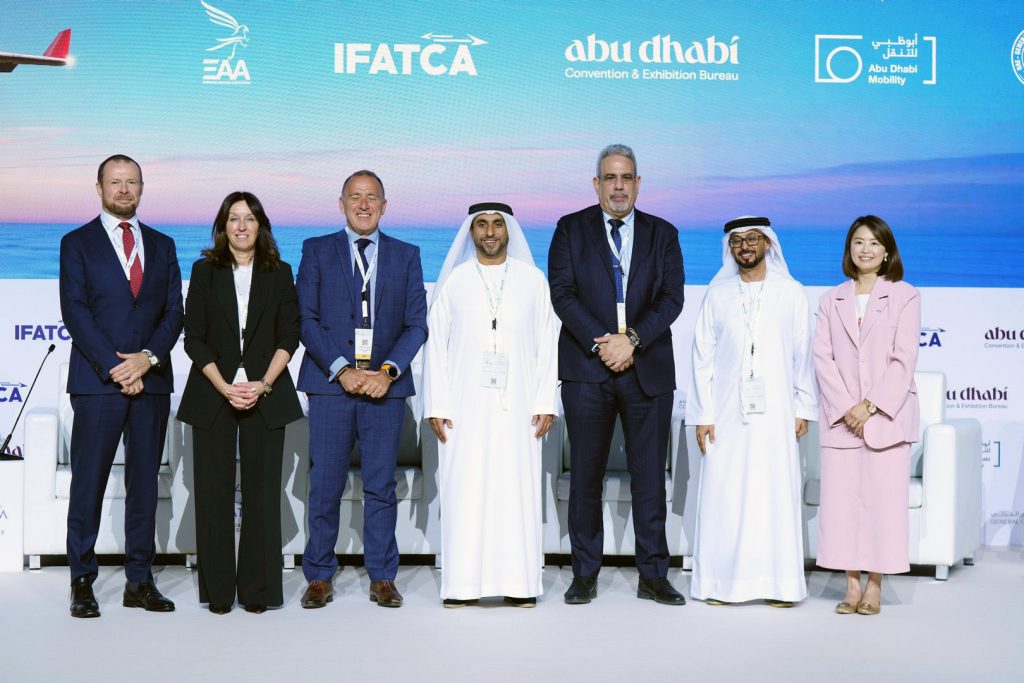
The second panel discussed Innovation in ATCO Training and Recruitment. Moderators were Andrew LeBovidge, EVP Americas-Elect and Tom McRobert, IFATCA’s EVP Finance. More on the debate can be found here: IFATCA General Assembly Panel 2 – Innovation on training and recruitment | Global Airspace Radar
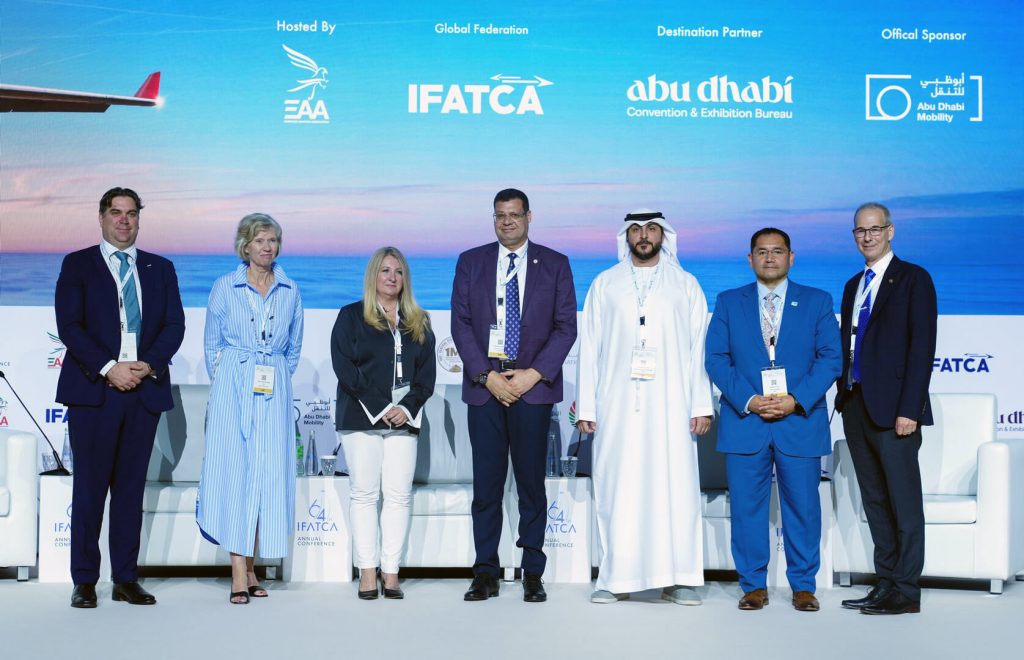
IFATCA 2030
Following the panel discussions, the IFATCA 2030 Task Force presented its final blueprint of proposals for the Federation’s future. This formally concludes the task force’s work and marks the start of the implementation phase of this ambitious plan to prepare our Federation for the coming decades.
ICAO & International Contributions
A presentation from ICAO to Directors included a thorough update from Anthony Ang, ICAO Technical Expert and Elie El Khoury, ICAO Technical Officer from the ATM Section. We were also honoured to have Chris Dalton, Former Chief of ICAO’s ATM Section of the Air Navigation Bureau, address the Federation.
The Japanese Federation of Air Traffic Controllers (JFATC) presented on the aftermath of the January 2024 collision at Haneda Airport. In particular, they informed the meeting of how it affected the involved air traffic controllers and what issues they are currently facing.
Other notable guests on this first day included EUROCONTROL, IFALPA and IFISA.
Day 2 started with well-attended regional meetings. Although informal, these offer a valuable opportunity to discuss more localised issues.
In the afternoon, the formal opening plenary followed. In addition to a number of procedural steps, such as the roll call, the Federation acknowledged its newest Premium Industry Partner, American Airlines, with their partnership scroll. The plenary meeting was then adjourned to allow the three committees to begin their work.
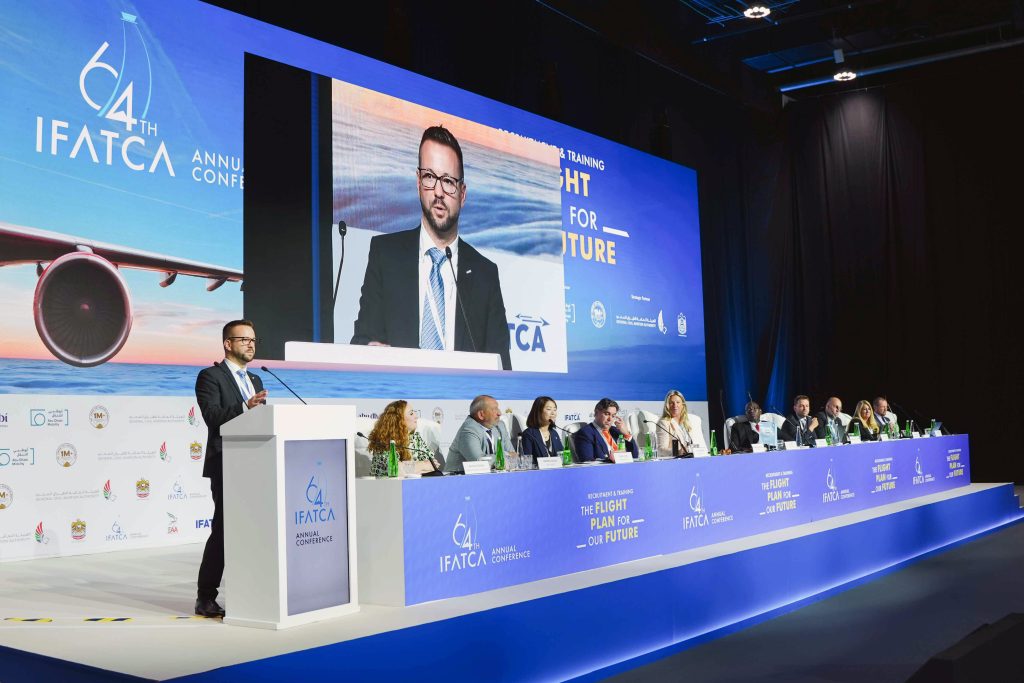
Committee A – Governance, Finance, Constitution and Administration
Jules Ogilvie (Helvetica) acted as committee Chair, assisted by his co-chair Brittney Armbrust (NATCA USA). All IFATCA Officers presented their reports. Particularly encouraging was the report from Helena Sjöström as President and CEO, which highlighted how visible the Federation has become and how it will be represented this coming year.
Industry Partner Baymac presented to directors on insurance solutions, like loss of license.
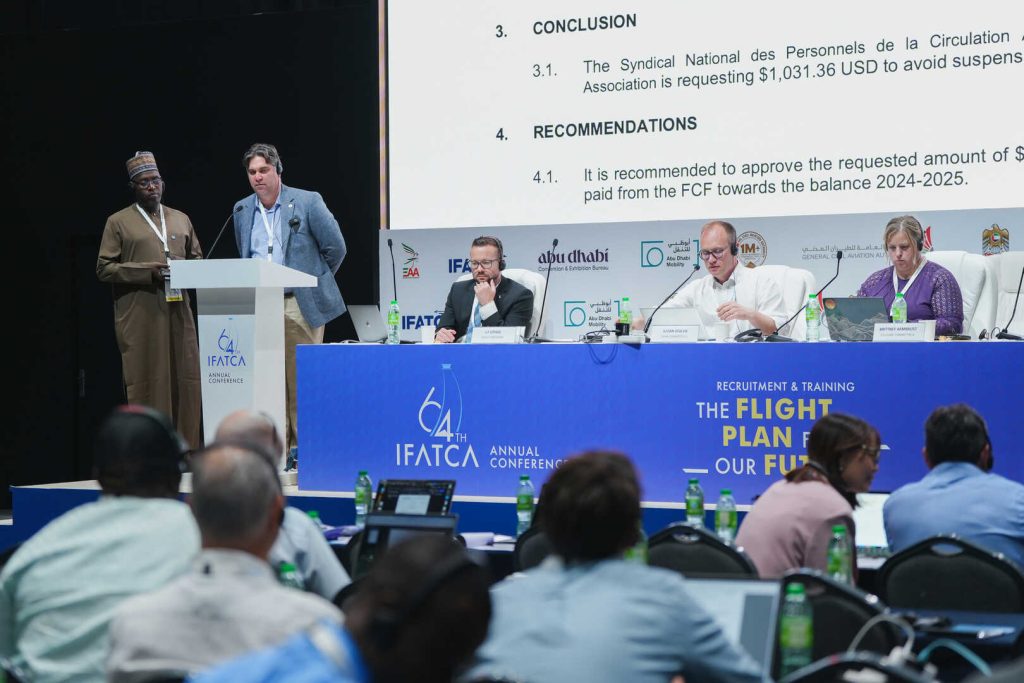
The Finance Committee (FIC), led by Daniel Nartey (Ghana) and Tom McRobert, EVP Finance (Australia), produced 5 work items, including reviewing financial records and providing updates to funding for REVP-elects and re-calculating the inflation adjustment tool. For the coming year, the seats on FIC will be taken by Malaysia, the Bahamas, Uganda with the USA, UK, and Zambia as corresponding members. Daniel Nartey was re-elected as FIC Chair for two more years.
The Constitution and Administration Committee (CAC), led by Rob Mason (Australia), produced 16 work items. These included proposals to enhance representation, refine committee operations, and explore an MoU with FACAA/ASECNA.
Nigeria, Senegal, and Ghana will serve on the CAC for the coming year, with Uganda, Kenya, Trinidad & Tobago, and Zimbabwe participating as corresponding members.
Future Conferences
Both Türkiye and Uganda presented their bids to host the 2027 Annual Conference. While both had excellent presentations, Uganda won the Directors’ vote to host the 66th Annual Conference.
Romania, which was selected to host the next conference in 2026, gave an update on their planning and was confirmed as host for next year’s event.
Elections
Election for Executive Board positions confirmed Deputy President Jean-François Lepage (Canada) and EVP Technical Benjamin van der Sanden (Netherlands). Trish Gilbert (NATCA USA) was elected as EVP Professional and Andrew LeBovidge (NATCA USA) was elected as EVP Americas.
Committee B – Technical and Operational
Acting as committee chair was Alex Schwassman (Germany), who was assisted by co-Chair Olivia May (GATCO UK). During the sessions, 71 Member Associations were present, holding 15 proxies. Representatives from ICAO and Industry Partners Entry Point North, Gate Aviation, American Airlines, Frequentis/Atrics, and Thales attended. The latter two provided valuable insights into technological updates that aim to increase ATCO productivity as well as job satisfaction in the near future.
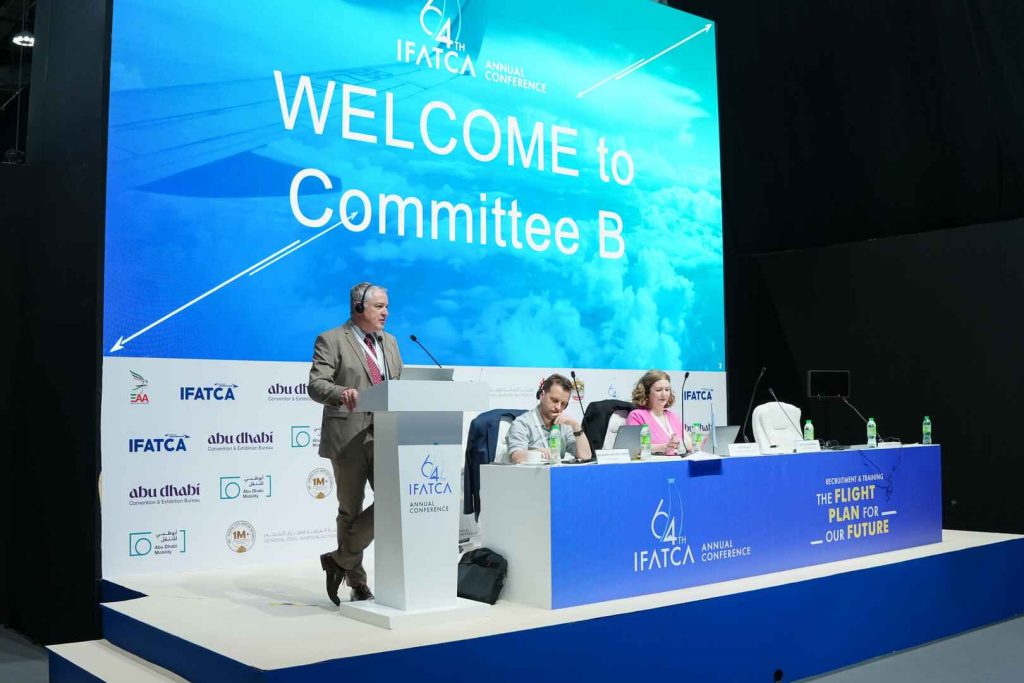
The Committee heard 14 reports from IFATCA officials and representatives to ICAO, and debated 7 working papers prepared by the Technical and Operations Committee (TOC). Two papers were accepted as information papers.
The committee recommended updates on key policies, including changes to barometric pressure setting monitoring, communication failure procedures, TBO mixed-mode interaction, and GNSS Jamming and Spoofing.
The continued work of the IFATCA representatives to ICAO under the guidance of our new Liaison Officer, Mr David Perks, as well as the members of TOC led by its Chair, Ms Jaymi Steinberg, was once more a testament to the high standard and professionalism that make IFATCA an important and respected player on the global stage of civil aviation.
A record number of Member Associations expressed interest in TOC participation for the period 2025/26: fifteen candidates for nine positions. TOC once more has Member Associations from all four IFATCA regions, which has become the new norm, another indication that the IFATCA community is strong worldwide.
Committee C – Professional and Legal
Sten Verpalen (Netherlands) presided over this committee with Nyamgerel Dashdolgor (Mongolia) as his co-chair. 71 MAs were present with 21 proxies. The committee discussed thirteen working papers, the majority of which originated from the PLC after extensive research and debate over the past year. Policy was accepted on positive safety culture and on enhancing Just Culture principles. Both were considered extremely important to the air traffic controller community, as, in many countries, these principles are either non-existent or in the (very) early stages of adoption.
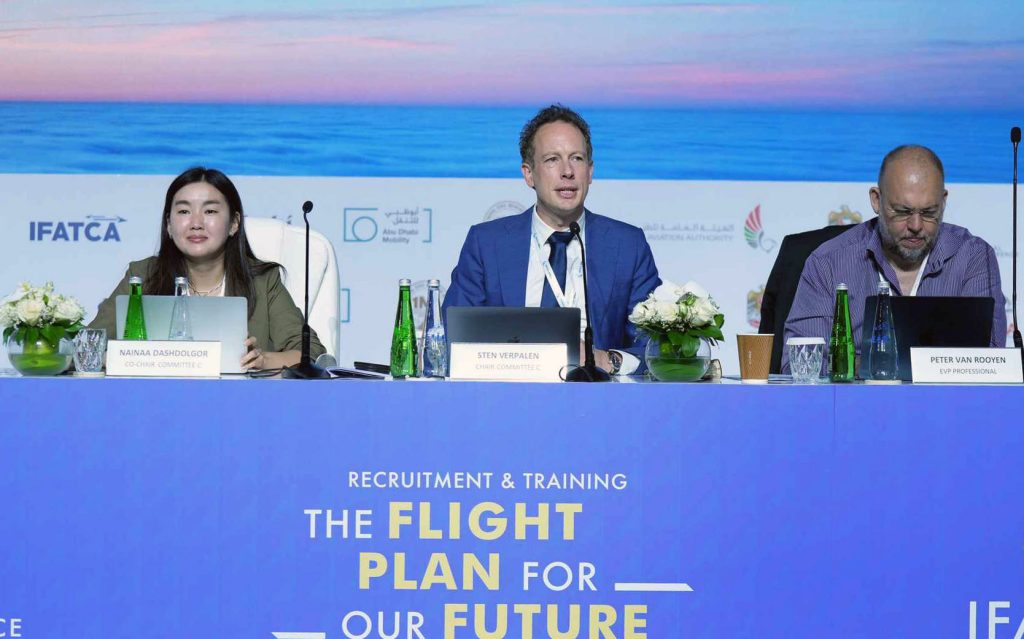
The committee also rejected the practice of “Low Capacity or other Restricted Endorsements” as a staffing mitigation. Updates to policy on breaks and staffing policy; on environmental awareness and its effects on aviation, specifically contrail avoidance trials.
A delegation from our Yemeni Member Association highlighted the challenges for air traffic control personnel in conflict zones. The host Member Association from the UAE presented four working papers in the committee to inform the delegates about new systems and practices in their ANSP. They also called attention to the global ATCO shortage.
Twenty-one MAs expressed interest in being elected to the PLC for the twelve positions. Congratulations to Canada, Greece, Italy, Jamaica, Japan, Mexico, the Netherlands, Nigeria, Romania, South Africa, Spain, and the United States of America for being elected to the committee. Some of the non-elected MAs will contribute as corresponding members.
Adam Exley (UK) concluded his term as PLC chair with distinction. Donna Field (Australia) was elected to replace him. Donna’s experience as an ATCO and as a PLC member means she is very well equipped to manage the continuation of the work.
Combined Committees B & C
78 Member Associations were in attendance, holding 18 proxies. A team of five representatives from the International Civil Aviation Organisation (ICAO) attended, giving proof to the fruitful relationship and mutual respect between ICAO and IFATCA. The tightly packed agenda started with reports from the newly appointed IFATCA Representative to the ICAO Air Navigation Commission, David Perks (Australia), who also provided updates to the work of several other IFATCA representatives to ICAO who could not attend.
The Committees then accepted the report of the IFATCA representative to the IFALPA ATS Committee, focusing on the proceedings between the IFALPA ATS Committee and the IFATCA Technical and Operations Committee. Three days of discussions between pilots and controllers provided rewarding discussions and valuable insights into our respective aviation domains.
This session’s policy decisions included system-based licensing, environmental issues in ATMS, simultaneous operation of remote towers, and safety nets.
The debate and adoption of a policy on ATM System Interoperability were particularly noteworthy. Finally, Member Associations were requested to submit job cards for future work.
Workshops
At the conclusion of business each day, a workshop was held. The subjects were “IFATCA 101,” Communications and Outreach, and Mental Well-being. All three were well attended, and the feedback was overwhelmingly positive, especially on mental well-being. That being said, holding workshops at the end of the day was challenging, and that was noted.
Closing Ceremony
During the Closing Ceremony, a Memorandum of Understanding was signed between IFATCA and the Fédération des Associations Professionnelles des Contrôleurs de la Circulation Aérienne de l’ASECNA (FACAA). The MoU establishes a cooperative relationship between FACAA and IFATCA to promote mutual interests, enhance the professional development of air traffic controllers, and improve the safety and efficiency of air traffic management in the ASECNA region, which comprises sixteen Member Associations located in the various member states of ASECNA.
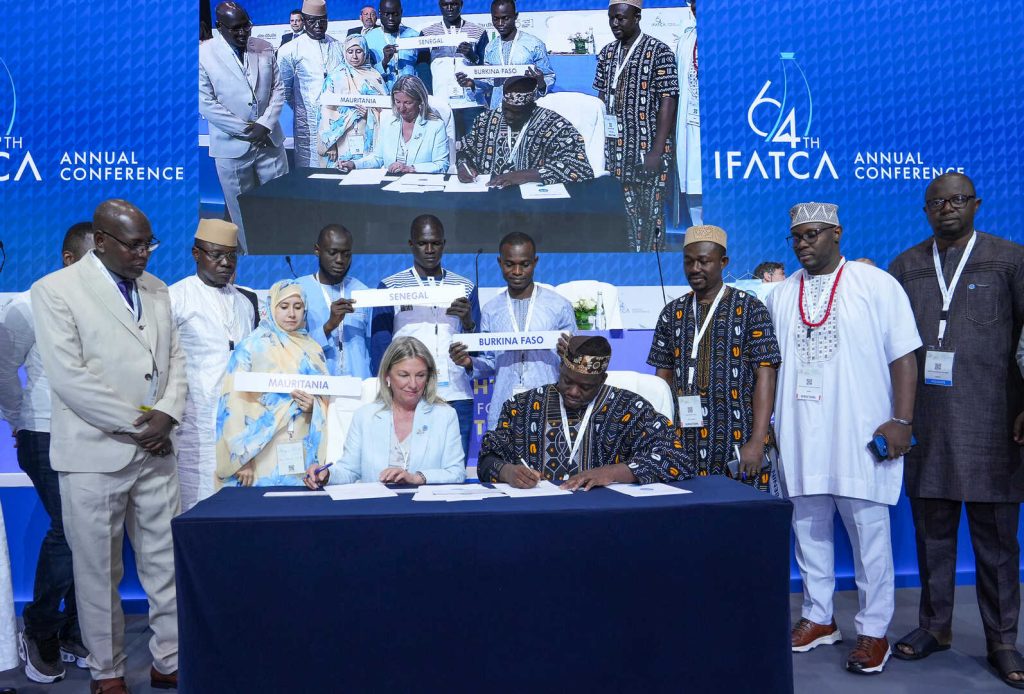
Member Associations from Chad, Congo Brazzaville and Suriname joined the IFATCA family. Awards were given to Peter van Rooyen (South Africa), Akos van der Plaat (Netherlands), Adam Exley (UK), Raf Vigorita (EGATS) and Chris Dalton (ICAO).
Thank you to all the delegates for your participation. Half of the committee rooms were filled with newcomers, some of whom actively contributed to the discussions, while others listened and learned. We hope you all enjoyed the experience and will stay involved in the Federation’s work going forward. Of course, our sincere gratitude to the Emirates Aviation Association and their dedicated organising team for delivering a well-structured, productive, and truly enjoyable conference in Abu Dhabi.
IFATCA 2025 in Numbers
Exhibiting
Baymac, Frequentis, L3Harris, United ATS, Thales
Attending
Entry Point North, Skysoft, American Airlines, FoxATM, Gate Aviation
New Partner
CAE were able to join us for one day!




